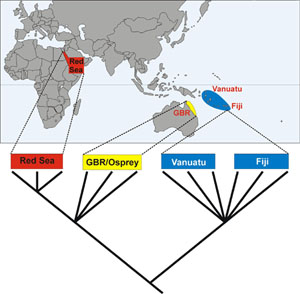|
|
|
|
|
Phylogeography is a research field that investigates the principles and processes that
govern the geographic distributions of genealogical lineages, especially those within and among closely
related species. One crucial task of phylogeographic studies is to attempt untangling the contribution
of historical vs. contemporary ecological processes in shaping present day species' distributions. Such
studies have great potential to provide substantially new insights into the processes responsible for
shaping the spatial patterns of genetic variation within and among populations as well as their
distributions, contributing significantly to our understanding of speciation. Phylogeographic studies
can also contribute significantly to conservation issues by identifying historically isolated lineages
and geographical areas in need of special protection.
|
|
|
We are primarily interested a) in understanding the influence of "deep-time" processes, such
as geotectonics, with resulting changes in oceanographic conditions, on the phylogeographic structure
of invertebrate faunas, and b) how processes on the shallow "ecological" time scale, such as
different life histories and dispersal patterns, combined with ocean currents and their changed
patterns during/after sea level low stands, contribute to the genetic cohesiveness (or lack thereof) of
sympatric and allopatric populations, as well as c) how such processes influence genetic diversification
and speciation. We are also interested in how we can utilise phylogeographic studies to conserve marine
biodiversity.
|
|
|
 |
|
|
|
Current research focusses on:
- Indo-Pacific invertebrate phylogeography (sponges, echinoderms)
- Deep sea phylogeography (sponges, echinoderms)
Key publications:
Vogler, C., Benzie, J., Lessios, H., Barber, P., Wörheide, G., 2008. A threat to coral reefs multiplied? Four species of crown-of-thorns starfish. Biology Letters 4, 696–699.
Wörheide, Epp, L., Macis, L., 2008. Deep genetic divergences among Indo-Pacific populations of the coral reef sponge Leucetta chagosensis (Leucettidae): founder effects, vicariance, or both? BMC Evolutionary Biology 8, 24.
Wörheide,
G., Hooper, J.N.A & Degnan, B.M. (2002): Phylogeography of western Pacific
Leucetta 'chagosensis' (Porifera: Calcarea) from ribosomal DNA
sequences: implications for population history and conservation of the Great Barrier Reef World Heritage
Area (Australia). Molecular Ecology 11 (9): 1753-1768.
|
|
